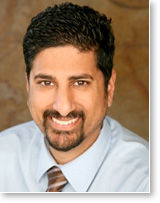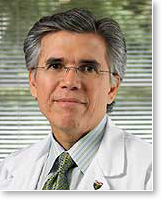Endocrinologist Sandeep Chaudhary, M.D., and cardiologists Robert Schneider, M.D., F.A.C.C., F.A.B.M.R., and César Molina, M.D., F.A.C.C., answer questions about effects of the Transcendental Meditation technique on Type 2 diabetes:
Q: How can the Transcendental Meditation technique influence Type 2 diabetes, which is a biochemical problem related to the inability of the body to make or to use insulin?

Sandeep Chaudhary, M.D.
As a secondary consequence, when the pancreas has been overworked for decades, it starts secreting less and less insulin. Now you need more insulin, but your pancreas can’t make any more; in fact, it slowly starts to die off because it’s been overworked for years.
Research published in the Archives of Internal Medicine in 2006 shows that the practice of the Transcendental Meditation technique can help during the initial stages, by lowering insulin resistance. So even though it’s true that some damage has been done to your pancreas over the years of developing diabetes, it doesn’t mean you can’t still be helped.

Robert Schneider, M.D.
Q: Does stress play a role in Type 2 diabetes as well?
Dr. Chaudhary: Yes, for the same reason that it does in obesity. When you’re stressed you tend to have higher cortisol levels, which increases insulin resistance; you also tend to eat the wrong foods, eat excessively, and eat at night because sleep patterns tend to be off in people who are anxious.
Eating at night is particularly bad for diabetics, because there is a natural five-minute spike in growth hormone at 3:00 a.m. This leads to a temporary increase in insulin resistance and subsequent higher blood sugar. If you have eaten something at midnight, blood sugars can spike even higher because of this growth hormone effect. This makes medication less effective. So it’s very important to control stress and anxiety when treating diabetes.
As shown by research, the Transcendental Meditation technique can help by decreasing stress and regulating sleep patterns, so the person is sleeping through the night and not eating at midnight because of stress or anxiety.

Cesar Molina, M.D.
——————————————————————————–
Sandeep Chaudhary, M.D., earned a double board certification in both Internal Medicine and Pediatrics at Loma Linda University Medical School and later earned his board certification in Endocrinology at the University of California, San Diego. He is currently the Medical Director of Wellspring Endocrinology at Scripps Memorial Hospital in La Jolla, California.
Robert Schneider, M.D., F.A.C.C., F.A.B.M.R., has been awarded more than $20 million in grants from the National Institutes of Health (NIH) for his pioneering research on natural approaches to heart disease. Dr. Schneider is the author of Total Heart Health and 100 medical research articles, and he has been featured in more than 1,000 media reports, including CNN Headline News, The New York Times, and Time magazine.
César Molina, M.D., F.A.C.C., is Medical Director of the South Asian Heart Center at El Camino Hospital in Mountain View, CA. He is a graduate of Yale University School of Medicine and a fellow of the American College of Cardiology. Dr. Molina has recently appeared in the international edition of CNN discussing the benefits of diet and exercise in the treatment and prevention of coronary heart disease.
Research reference: Arch Inter Med. 2006;166:1218-1224
Source: www.DoctorsOnTM.org
© Copyright 2011 American Association of Physicians Practicing the Transcendental Meditation Technique



